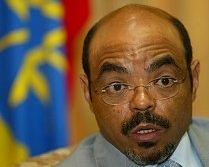Ethiopia’s PM: Somali Islamists a danger to international community
Nov 01, 2006 (ADDIS ABABA) — Ethiopia’s prime minister said Wednesday that Islamic militants in Somalia represent a threat to the Horn of Africa and the entire international community and that more must be done to contain them.
 Prime Minister Meles Zenawi told The Associated Press he held out little hope that a peace agreement could be reached between Somalia’s internationally recognized government and Islamic militants who have taken over much of the country. Ethiopia, a largely Christian nation, supports neighboring Somalia’s secular government.
Prime Minister Meles Zenawi told The Associated Press he held out little hope that a peace agreement could be reached between Somalia’s internationally recognized government and Islamic militants who have taken over much of the country. Ethiopia, a largely Christian nation, supports neighboring Somalia’s secular government.
“Apparently some people believe that the al-Qaida elements in Mogadishu … are people one can talk to in a reasonable manner, that they can be convinced not to be extremists,” Meles said in an exclusive interview.
The extremists “represent a direct threat first to Somalia and the Somali people, second to the region and Ethiopia and lastly to the international community,” he said. “When they control the whole of Somalia it would be very naive to assume that they will mend their ways, cease to be terrorists and become very civilized and very tame pussycats.”
Meles has confirmed that he has sent military advisers to help Somalia’s weak government, prompting Islamic leaders to declare a holy war against Ethiopia.
“In effect they have declared war on us, they have massed their troops very close to our border, so they have publicly shown that they pose a direct security threat to us,” Meles said. “It would be a dereliction of duty for any Ethiopian government to ignore that and welcome the takeover of the whole of Somalia by jihadists.”
Meles declined to discuss what action he might take against the Islamic militias.
The Arab League has sponsored peace talks between the Somali government and the Islamic courts. But so far the talks, being held this week in Khartoum, Sudan, have been deadlocked. Meanwhile, Islamic militias expanded their control over Somalia by taking over a strategic coastal town Tuesday night. The fighters peacefully seized Hobyo in the central Mudug region, according to an Islamic official.
The leaders of the Council of Islamic Courts have demanded that Ethiopian troops withdraw from Somalia before they will meet with the government. They have also called for the secular national charter to be replaced with Islamic law.
But Meles said he has little faith that extremist elements within the Islamic courts would ever honor an agreement with the transitional government.
“I think so far the talks have not been serious, I believe the (extremists) believe they have the military momentum and that they are using the talks in Khartoum as a cover for their military takeover,” Meles said.
He added that international diplomats are not taking the threat posed by the Islamic courts seriously. The Islamic courts appear to be split between a moderate wing, ready to negotiate with the government, and an extremist wing led by men the United States accuses of having ties to al-Qaida, Osama bin Laden’s terrorist group.
Meles insisted that the Ethiopian troops inside Somalia are there to train a new Somali national army and protect the government. He said the training began about a month ago and the new army was not yet capable of protecting the transitional government.
A recent U.N. report said there are between 6,000 and 8,000 Ethiopian troops in or near Somalia’s border with Ethiopia. The report also said 2,000 troops from Ethiopia’s rival, Eritrea, are inside Somalia, supporting the Islamic courts.
Ethiopia and Eritrea fought a two-year border war and tensions remain high since a final peace deal has not been reached. Meles said he had information that Eritrea was not only supporting the Islamic courts, but also training Ethiopian rebel groups hiding in Somalia.
Meles first warned the world about the Islamic militants in a May 2005 interview with the AP, but he said the world did little to support the transitional government. He said the Islamic militants took advantage of the government’s weakness to become the most powerful military force in the country.
“I believe the international community could have done more and should have done more,” he said.
(AP)
